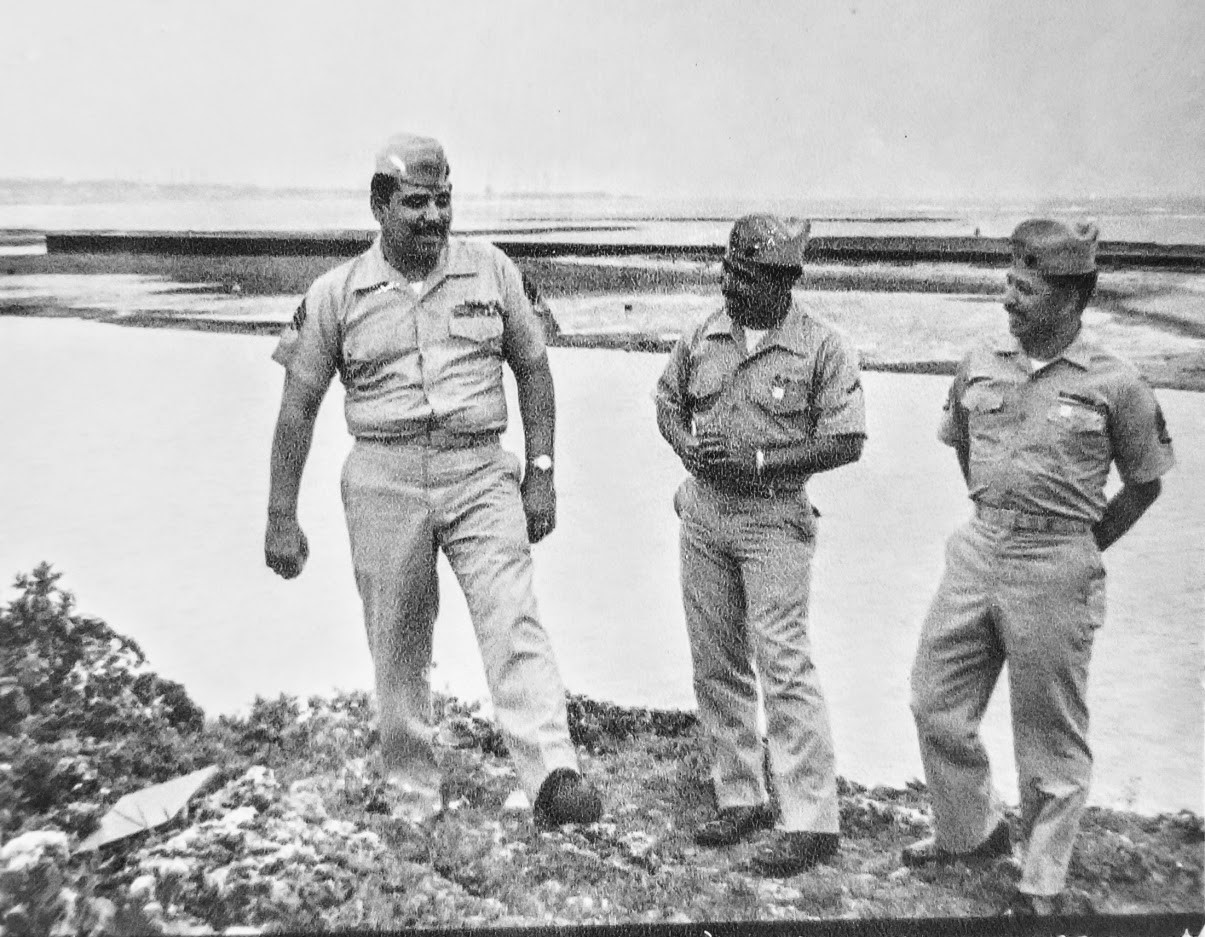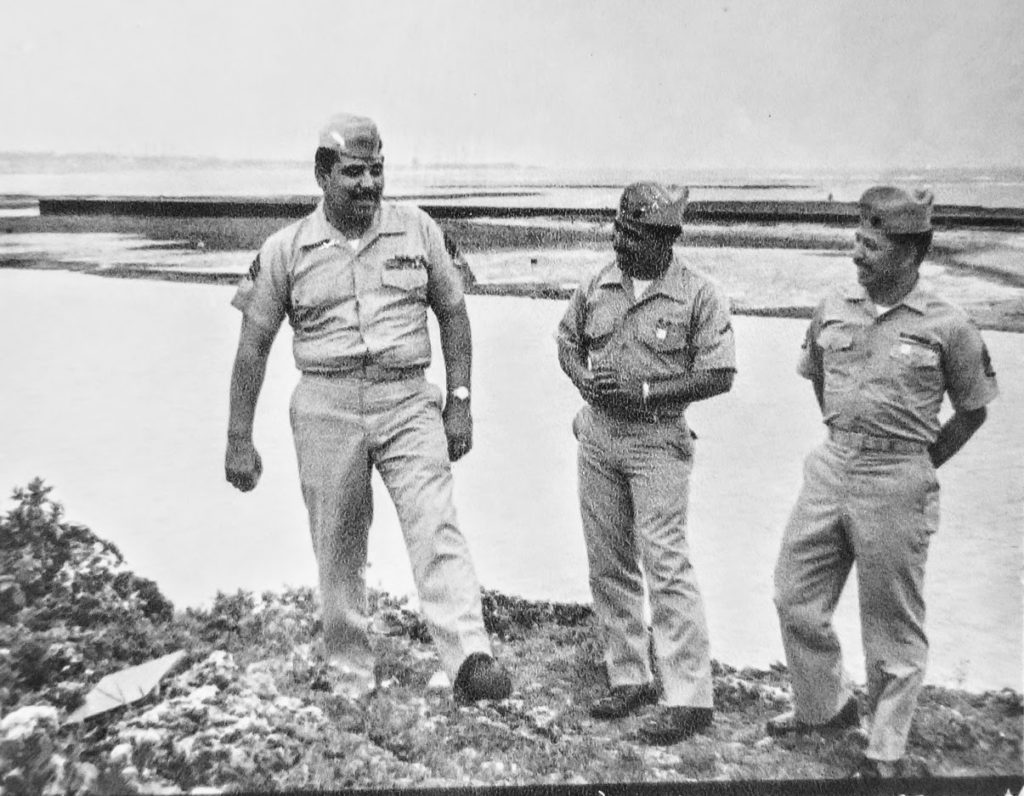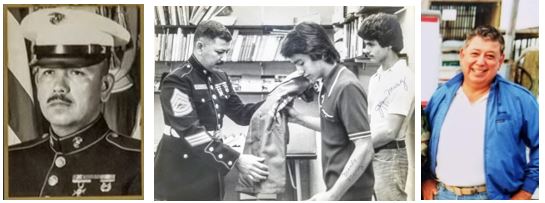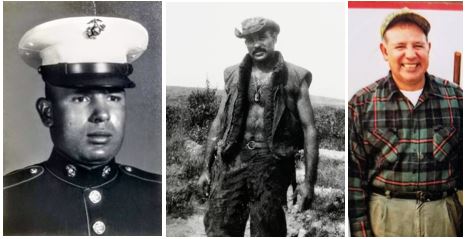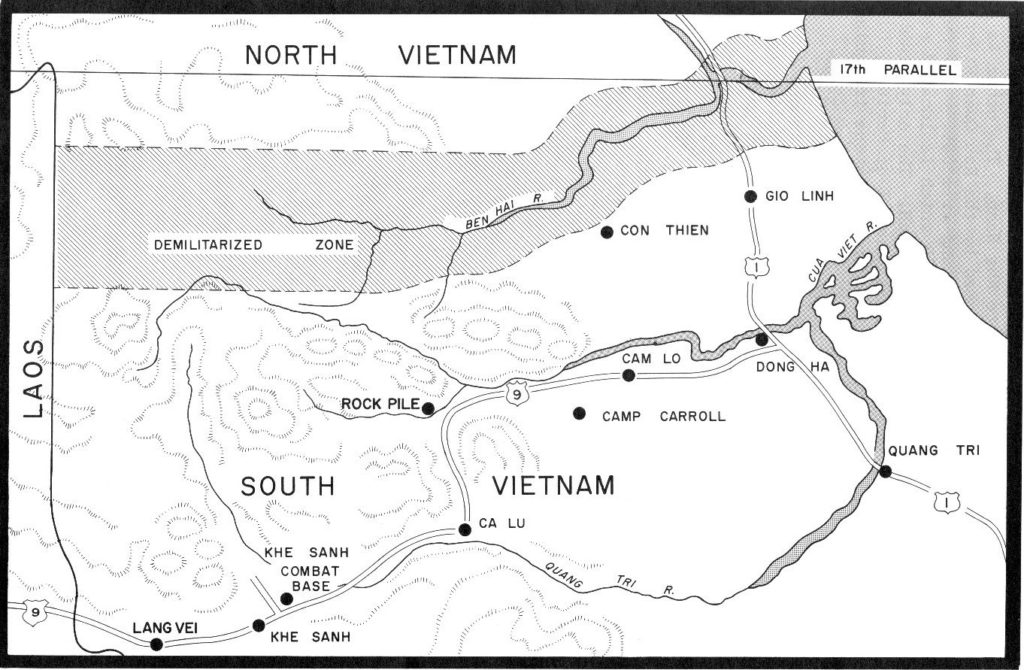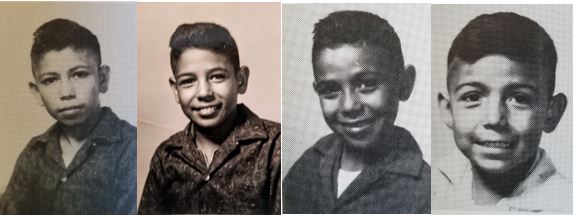To preserve the rich history of Flour Bluff, The Paper Trail News, will run historical pieces and personal accounts about the life and times of the people who have inhabited the Encinal Peninsula. The stories have been gleaned from interviews held with people who remember what it was like to live and work in Flour Bluff in the old days. You won’t want to miss any of these amazing stories.
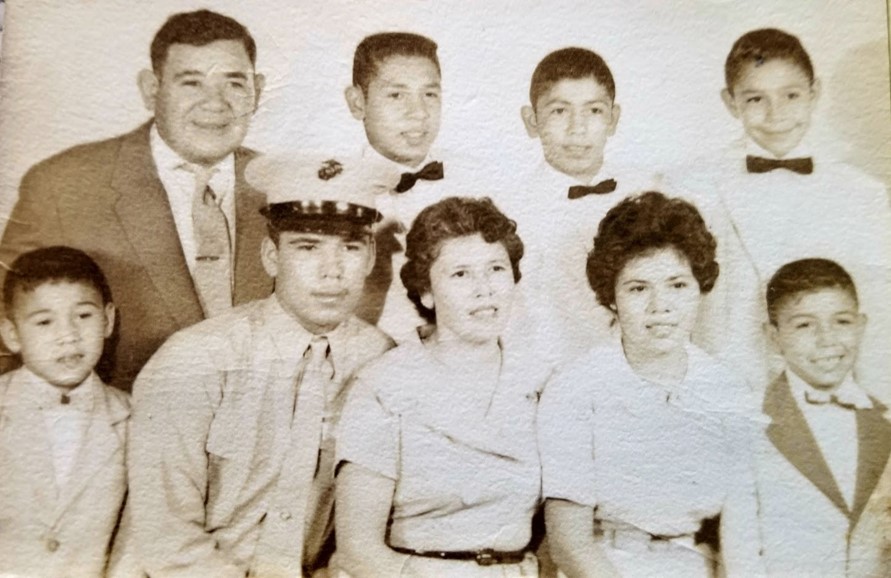
Top row (L to R): Daniel (Dad), Reynaldo (Rey, 4th child), Raul (Rudy, 3rd child), Rogelio (Roy, 5th child) Front row; Bottom row (L to R): Ricardo (Ricky, 7th child), Rafael (Rocky, 1st child), Hortensia (Mom), Rebecca (Becky, 2nd child), and Roberto (Bob, 6th child)
Daniel and Hortensia Torres, who lived through the Great Depression, had certain expectations of their sons. It was required that they work hard, give their best, respect the family name, stand up for what’s right, trust in God, and look out for one another. When the Marines went looking for a few good men, they found quite a few living under the same roof on Orange Street in Flour Bluff, Texas. Four of the six Torres boys joined the Marine Corps. Even their sister Rebecca, who was a nurse, married a Marine, Virgil Selph. But what drew these young men to enlist at a time when others were dodging the draft? Perhaps it was the part-time jobs they held at the Marine barracks at NAS Corpus Christi, the influence of other family members who had enlisted, or the desire to take their physical and mental abilities, strong work ethic, and competitive spirits to the ultimate level.
[spacer height=”20px”]
Rafael (Rocky) was the first to enlist. He finished 10th grade at Flour Bluff High School. Though he was strong from lifting bags filled with potatoes, he wanted to bulk up his 5’11” frame, so he signed up for the Charles Atlas Body Building Course. Rocky decided to join the military after a cousin came to visit dressed in his Army uniform. Rocky first tried to sign on with the Army and the Navy, but he lacked the required high school diploma. Then, in early January 1961, Rafael H. Torres became a United States Marine.
The Marines sent Rocky well beyond his familiar territory of South Texas.
“Once Rocky left, we lost track of him,” said younger brother Rey Torres. “We were in school, playing sports and working, and it wasn’t easy to communicate with him.
“First, they sent Rocky to Hawaii,” said younger brother Rudy Torres. “Then he went to Clark Air Force Base in the Philippines.”
Bob Torres wrote, “Later that year [1961], he heard the first incoming rounds being fired at him – in the Philippines. The next year he didn’t actually hear rounds pouring in, but he was in a hostile zone in Cuba. He was at Guantanamo Bay, when Fidel Castro shut off the water that flowed to the Marine encampment. A few years later, he was in Vietnam. This time, he wasn’t so lucky. He was hit twice.”
[spacer height=”20px”]
[spacer height=”20px”]
Bob explained in the article how Rocky had been there for all the Torres brothers who became Marines even though he didn’t necessarily want them to join. After being wounded in Phu Bai, Rocky was haunted by the voices of his comrades who didn’t make it out of Vietnam. This prompted him to volunteer to go back to Vietnam to perhaps prevent the deaths of other Marines. Rocky would eventually be wounded 3 times, each one earning him a Purple Heart, and reach the rank of gunnery sergeant. He returned to Oceanside, California, where he married and started a family. He returned to Flour Bluff and worked at NAS CC in the supply field until he retired in 1981. He lived out his life in Flour Bluff in a house he built next to the he grew up in on Orange Street. Rocky died May 2, 2002.
[spacer height=”20px”]
Rudy was the second Torres son to join the Marines, reporting in June 1965. He was one of eight recruits meritoriously promoted to Private First Class upon graduation in October 1965. This was the first of many successes that Rudy would experience in the Marines. He, like his brothers, always went beyond the call of duty.
The citation accompanying the medal read, in part, “For the meritorious service in the superior performance of his duties while serving as Battery First Sergeant, Headquarters Battery, Eleventh Marines, from 13 December 1984 to 1 August 1985….First Sergeant Torres’ exceptional professional ability initiative and loyal dedication to duty throughout his 20 years of service reflect upon himself, the Marine Corps and the United States Naval Service.” It also reflects upon his parents and the character, values, and morals they instilled in all their children.
In February 1967, Cpl. Torres reported for Drill Instructor School at Parris Island, S. C., graduating in August 1969. This earned him the rank of Sergeant and put him on the road to becoming a superior recruiter. His first duty was in San Antonio, Texas, in 1970 and 1971, where he averaged 8 accessions a month and over 200 new Marines. He was named “Recruiter of the Month” on five occasions. During this period, he recruited 14 new accessions on four separate months and was the recipient of the Marine Corps Leagues “Recruiter of the Year.” In August 1971, the National Marine Corps League Convention took place in San Antonio. Sgt. Torres was chosen to escort the legendary movie star John Wayne for over a week when The Duke received the “Iron Mike Award” for contributions in his portrayal of American Patriotism. During this time, Rudy met the famous General Lewis Walt, a notable high-ranking Marine.
Though Rudy would not see combat, he continued to excel at whatever task he was given and received many meritorious promotions and numerous accolades. In 1972, he had the honor of recruiting his younger brother Bob. Within a short time, Rudy would be sent to Okinawa where he was able to spend almost six months with Rafael and Bob, the most time they had spent together since they were young and at home in Flour Bluff.
In April 1983, at the age of 39, 1st Sgt Torres was authorized a double waiver (medical and age) to attend the Army Jump School at For Benning, Georgia. Upon completion of the course, Rudy was awarded the coveted Silver Wings. After making the required parachute jumps, he was awarded the prestigious Navy-Marine Corps Gold Wings insignia. On August 1, 1985, at his retirement Regimental Parade, Rudy was awarded the Navy Commendation Medal for Meritorious Service. Though retired, Rudy continues to take care of those who have served.
Rey Torres followed in his older brothers’ footsteps and became a Marine, but not right away. Rey was willing to fight for what he wanted. His first real battle came when he stood up to his dad who would not allow the boys to play football. It was not easy, but Rey did it and forged the way for all his brothers. After graduating in 1966 from Flour Bluff, he received a small scholarship to attend Del Mar. Then, the money ran out, and Rey volunteered for the draft July 3, 1968.
“After I passed all my physical exams, I remember standing in a line of about 10 people in the Marine line,” said Rey. “The Army line was really long. A Marine sergeant came out and had everyone in the Army line number off 1-2, 1-2. All the ones were moved to the Marine Corps line. I made it through boot camp and thought I’d get to go home for a while, but they sent me to Infantry Training Regiment to prepare me for Vietnam.”
“There was a big, red sign with yellow letters,” said Rudy. “The more you sweat in peace, the less you bleed in war.”
“I had to qualify at the shooting range. They cut 16 weeks of training to 12 because I was going to Vietnam. It was a tough 12 weeks because Rafael was my PMI – Primary Marksmanship Instructor. He would twist me and prod me. I left there a Marksman, which is just passing. I think I would have scored higher if my brother hadn’t been there,” Rey said, laughing. “The one advantage I had with him there was that he would slip me chocolate. We weren’t allowed to have any candy.”
After Rey graduated, he became the battalion typist because he had taken Typing I, II, and III with Mr. Massingill at Flour Bluff. “I was excited,” said Rey. “I typed for one week. Then, I received orders that I would be leaving for Vietnam at 0700 the next morning.”
[spacer height=”20px”]
[spacer height=”20px”]
Upon arrival in Vietnam, the plane carrying Rey and the other Marines couldn’t land. The landing strip was being mortared. They circled until it was clear to land. Then, everyone was led to a big barn where they received their unit assignments. Rey’s unit was at the front. They had to walk Highway 1 to reach the front, which was difficult since it was an area known to have snipers. They were cautioned to walk in groups and look out for one another.
“We headed out and were picked up by a truck that took us to the frontline,” said Rey. “We were supposed to have 7 days to get acclimated to the hot, steamy weather. On the second day, I was told that I had to go in as one of the replacements for 7 guys. When we got there, we were shown three dead Marines and told that if we didn’t listen and do what we were told, that we would end up like them. It was an awakening for me.”
Rey was in the demilitarized zone between North and South Vietnam. During that time, he did indeed learn to look and listen. Rey recalls how another Marine saved his life when he failed to do the right thing.
“I was a rookie, and we were getting incoming rifle fire,” said Rey. “I didn’t know where it was coming from, so I was leaning against a tree. This guy grabbed me and pulled me to the other side of the tree and saved my life. From then on, it was three months of constant combat.”
Rey was just 20 years old when he was wounded on the front line. What happened that day was the stuff movies are made of.
To be continued….
NOTE: The Torres men gave of themselves to preserve the freedoms of this country, as did many others who served in all branches of the service. We will recognize these men and women in the Nov.1 and Nov. 15 editions of the paper to coincide with Veterans Day on November 11, 2019. In the next edition, we will finish Rey’s story of heroism and relate the military careers of Bob Torres and Virgil Selph, brother-in-law of the Torres brothers.
__________________________________________________________________________________
The editor welcomes all corrections or additions to the stories to assist in creating a clearer picture of the past. Please contact the editor at Shirley.thornton3@sbcglobal.net to submit a story about the early days of Flour Bluff or submit a correction.
